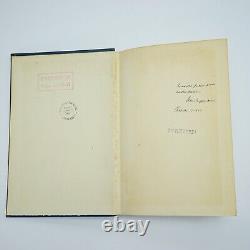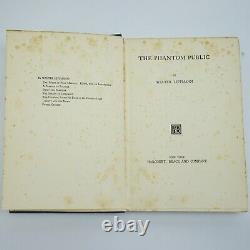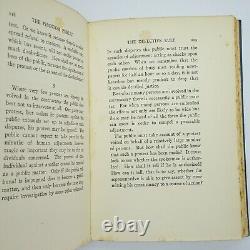LIPPMANN, Walter The Phantom Public. 1925 1st Edition SIGNED













1925 1st Ed Inscribed and Signed by Author. NEW YORK: Harcourt Brace and Company. Blue cloth with white paper title plate to spine.
From private library at Dartington Hall. Author inscription and signature to ffep dated 1925. Pages: 205 Size: 8vo 21cm by 14cm. Inscribed and Signed by Author. Inscribed "To an old friend from an old friend". This possibly refers to Dorothy Elmhist (nee Whitney) of Dartington Hall - see provenance. Dartington Hall School was founded in 1925 by Leonard and Dorothy Elmhirst. Dorothy married American investment banker Willard Straight.In 1914, along with the help of both Walter Lippmann and Herbert Croly, Dorothy and her husband founded the influential liberal magazine, The New Republic. In the 1920s, Leonard lived in India serving as the Secretary to the 1913 Nobel Laureate for Literature Rabindranath Tagore. With funding from Dorothy, Leonard had helped Tagore set up the Institute for Rural Reconstruction that would have a material influence on the Elmhirst's Utopian experiment at Dartington. Dartington Hall was social and cultural experiment exemplifying an influential moment of British and international social reform triggered by the First World War.
Reformers considered the war as a sign that the self-oriented and materialist nineteenth-century doctrine of laissez-faire liberalism had failed. Dartington Hall was one of many attempts to pursue a more Utopian approach. Dartington Hall School offered a progressive co-educational boarding life. There was minimal formal classroom activity and the children learned by involvement in estate activities. It was to have no corporal punishment, indeed no punishment at all, no prefects; no uniforms, no segregation of the sexes; no compulsory games, compulsory religion or compulsory anything else, no more Latin, no more Greek; no competition; no jingoism. Walter Lippmann (1889 -1974) was an American writer, reporter and political commentator. Famous for being among the first to introduce the concept of Cold War, coining the term "stereotype" as well as critiquing media and democracy in his newspaper column and several books, most notably his 1922 book Public Opinion. Lippmann also played a notable role in Woodrow Wilson's post-World War I board of inquiry, as its research director. His views regarding the role of journalism in a democracy were contrasted with the contemporaneous writings of John Dewey in what has been retrospectively named the Lippmann-Dewey debate.Lippmann won two Pulitzer Prizes. In an era disgusted with politicians and the various instruments of "direct democracy, " Walter Lippmann's The Phantom Public remains as relevant as ever.
It reveals Lippmann at a time when he was most critical of the ills of American democracy. Anti-populist in sentiment, this volume defends elitism as a serious and distinctive intellectual option, one with considerable precursors in the American past. Lippmann's demythologized view of the American system of government resonates today. The Phantom Public discusses the "disenchanted man" who has become disillusioned not only with democracy, but also with reform.
According to Lippmann, the average voter is incapable of governance; what is called the public is merely a phantom. In terms of policy-making, the distinction should not be experts versus amateurs, but insiders versus outsiders. Lippmann challenges the core assumption of Progressive politics as well as any theory that pretends to leave political decision making in the hands of the people as a whole. If you have a particular requirements please contact me before purchasing.
Light wear to corners, edges and spine ends. Private library number to lower spine end.
Clean cloth with toned title plate to spine. Tightly bound with toned intact endpapers with strong hinges. Dartington Hall stamps to front paste down and publication page. Author inscription to ffep with additional date stamp.Faint spotting to endpaper gutter. Heavy foxing to prelims and all pages up to page 37. Lighter foxing primarily to page margins thereafter with occasional heavy foxing to some pages. Heavy spotted text block edge.

